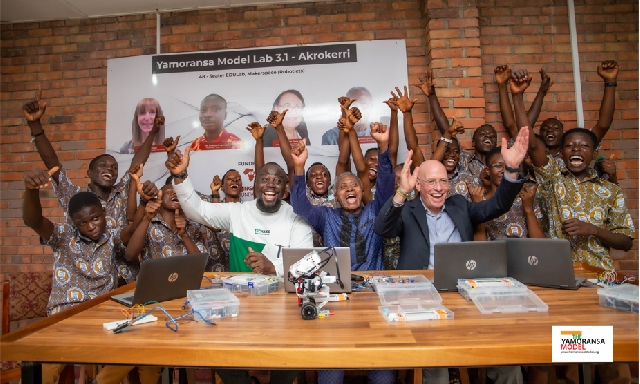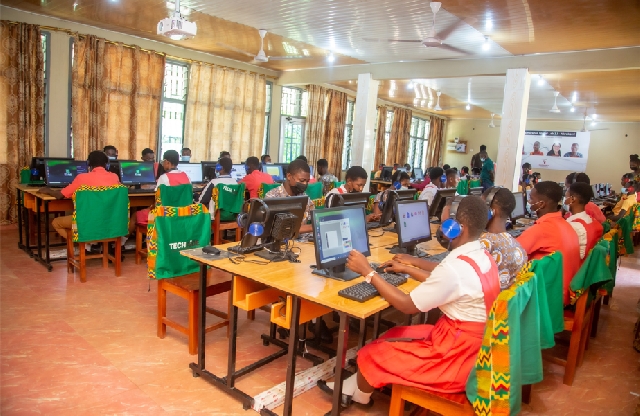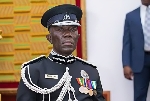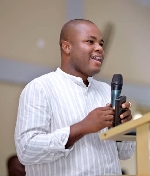STEM: HAF provides three communities with ICT centers
 Happy at the lab
Happy at the lab
The Helping Africa Foundation (HAF) has provided Asare Bediako SHS in Akrokerri, Ashanti Region; Bomaa community in the Ahafo Region, and Tuobodom community in the Bono East Region of Ghana with ultramodern ICT centers to promote the teaching and learning of ICT under the foundations flagship program, the Yamoransa Model Labs Program.
All projects comprise a 48-seater educational lab (known as EDULab) and powered by an ASANKA device that enables students to access educational materials without the internet.
The labs are built by TECHAiDE, a Ghanaian technology company working in Africa for over a decade using ICTs to improve Education, support youth development, and facilitate health delivery. Among robotics facilities provided in the MakerSpace for innovation and creativity are tools for 3D Design and Printing; Coding with Legos and Arduinos; and Virtual and Augmented Reality. BothYM Labs 9 and 10 have a conference room and Center managers office.
Speaking at the dedication ceremony of the respective projects, the Project Manager & CEO of TECHAiDE, Mr. Kafui Prebbie, disclosed that the facilities in Bomaa and Tuobodom are powered by solar as part of the sustainable model of the projects.
"The computers installed in these facilities are of low voltage. This means they consume only 10% of the power used by the everyday computer and this is to ensure that the communities are not burdened with utility bills and no student is to be charged for using the facility" he remarked.

At the dedication ceremony of the centre in Akrokerri dubbed YM Lab 3.1, the Second Deputy Speaker of Parliament and MP for Fomena Adansi, Mr Andrew Amoako Asiamah assured the Asare Bediako Senior High school that he will adopt the school as it is one of the most deprived schools in the Region. He also encouraged teachers and students to make good use and properly maintain the facilities provided by the Helping Africa Foundation.
Executive Director of the Helping Africa Foundation, Mr. Japhet Aryiku stated that the vision of the Foundation is to equip every Ghanaian school-going child with the skills needed to be globally competitive.
"The vision of the HAF is to bring quality and accessible education to all Ghanaian children to ensure they acquire the right skills in order to be competitive in the global market regardless of the location," Mr Aryiku said.
He further added that these 3 labs bring to a total of 10 labs out of the 16 labs HAF intends to build in all 16 regions of Ghana.
At Bomaa in the Tano North Municipality, the Municipal Chief Executive, Mr. Ernest Kwarteng admonished the community to handle the facility with care and ensure it is maintained well.
In a related development, the Promoter of the Yamoransa Model Lab 10, Honourable Elizabeth Ofosu-Adjare, MP for Techiman North at the dedication ceremony in Tuobodom expressed her gratitude to the Helping Africa Foundation for their sterling intervention in providing the community with such a facility. According to her, the facility puts Techiman North ahead of the government's plan to introduce Robotics and Coding into the Ghanaian educational curriculum. She extolled the virtues of robotic education. “Robotic education creates an environment that embraces people with varied talents. It promotes creative thinking, strategic thinking, logical reasoning, computational and analytical skills, which are undeniably essential skills required from the 21st century citizen in this competitive globe”.
The Yamoransa Model Labs is an initiative started by the Helping Africa Foundation, aimed at providing opportunities for students to expand their knowledge in STEM education through practical experience. The model is a partnership between HAF, the District Assemblies and the District Education Directorate. It is managed by IMPLEMENTERS a project management non-profit organization that partners with charitable organizations, philanthropists and corporate institutions to positively impact communities. IMPLEMENTERS will manage these projects for the next two years before handing it over to the local authorities through a sustainable plan.
Source: Classfmonline.com
Trending News

Presidency instructs IGP to investigate deaths of 8 during 2020, 2024 elections
16:55
Appointees must remember the youth while in gov't - NDC's Nat Tetteh
14:03
GWCL: Our life is in danger, no water to drink, help us restore – Ho residents
15:56
SONA: Serving as President is the greatest honour of my life-Akufo-Addo
11:32
Prof Aseweh Abor encourages 'young ladies' to choose VP Opoku-Agyemang over 'big married men' for inspiration
15:34
Meta to offer wider range of speech on platforms, CEO says
13:51
President Akufo-Addo grants presidential clemency to collapsed Capital Bank owner and Others
14:38
V/R: Water crisis as GWCL shuts down Kpeve Headworks for emergency repairs
12:23
Three killed, five injured in Police shooting at Newmont Ahafo South mines
12:39
President Mahama revokes MMDCEs and Assembly Members' appointments nationwide
12:06




